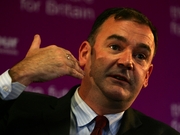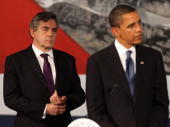On second thoughts, maybe Labour should keep Brown in place…
Over at his essential blog, Benedict Brogan says that Dave ‘n’ George deserve some praise for Moody’s decision to retain the UK’s AAA credit-rating. His thinking: that because Messrs Cameron and Osborne have been going on about debt and the need to cut spending, investors – anticipating a Tory government – are more confident about Things to Come. A similar point is made by Edmund Conway in a comment piece for the Telegraph today: “Part of the reason the debt markets have remained relatively sanguine in the face of a staggering collapse in tax revenues and increase in the deficit is that they are assuming a Conservative victory: when the





















